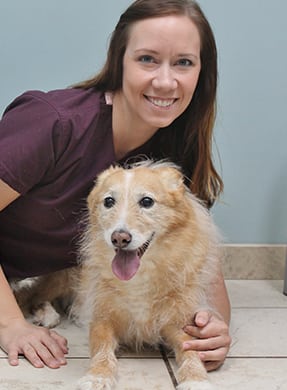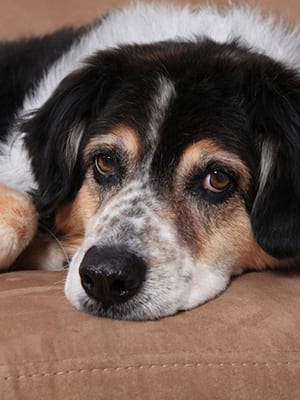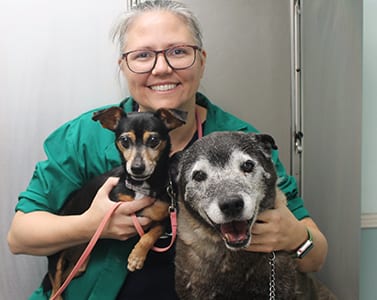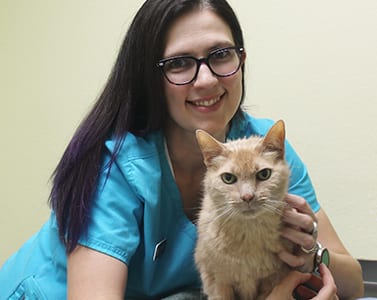Cat and Dog Senior Care in North Charleston, SC
As pets get older, they need more care and attention. Outward signs of aging can be easy to spot, but signs of internal changes often are not. Older pets are more likely to develop diseases such as heart, kidney, and liver disease as well as cancer. Regular veterinary examinations and routine screening diagnostics can detect problems in senior pets before they become advanced or life-threatening and can help your pet live a longer and healthier life. Once your pet reaches a “senior” age (around 8 years), we recommend increasing preventive visits from annually to every six months in order to more closely monitor internal and external aging changes in your pet. We also offer a Senior Wellness Package, which helps to screen for early signs of health issues. If you have any questions, be sure to call us at (843) 553-0441.
Remember that age itself is not a disease. Animals develop age-related problems that can often be helped with good veterinary care. Many times we are able to greatly improve a senior pet’s quality of life by addressing the issues associated with older age. Problems that are more common in senior pets include:
Poor vision and hearing
Though it is often normal for pets to lose some of their sight and hearing as they age, there can be medical reasons behind these changes that could potentially cause harm if left untreated. For instance, pets can develop eye conditions such as glaucoma and cataracts and can form polyps or tumors in their ear canals. Regular veterinary visits include thorough examination of the eyes and ears, which can often detect these issues early on.
Decrease in activity and/or appetite
Many pet owners report that their senior pets are starting to “slow down”. Sometimes they show reluctance to climb stairs or jump on furniture like they used to, or they simply don’t want to run and play like usual. Sometimes they don’t eat full meals anymore and turn down treats. Regular veterinary visits can help detect potential causes of this behavior, such as arthritis and other sources of pain, metabolic organ changes, and cancer. Depending on the cause of these changes, there are many things that can be added to their daily care at home to greatly improve these symptoms.
Our Senior Wellness Package includes:
- Detailed senior exam (during which any concerns or problems can be addressed)*
- Senior screening bloodwork to evaluate major organ function
- Thyroid function testing
- Urinalysis
*further diagnostic testing or procedures not included in package price
SAVE 10% ON THIS PACKAGE DURING SENIOR PET MONTH IN NOVEMBER AND DECEMBER!
Behavior changes
It is tricky to determine the cause of some behavioral changes in senior pets because they can occur due to a variety of issues. Grouchy or unusually aggressive behavior could be due to discomfort or pain caused by any number of age-related conditions. Accidents in the house could be caused by incontinence or urinary infections. Increased vocalization could indicate pain, discomfort, high blood pressure, or an overactive thyroid. Many of these changes seen together, especially when accompanied by disoriented behavior, could be due to a common senior problem called cognitive dysfunction (similar to senility in people). Through more frequent examinations, your veterinarian is better able to determine the cause of behavior changes in your pet and can often recommend appropriate treatments to improve and even eliminate these behaviors.

Dental problems
Poor dental health is worrisome in older pets because dental disease has been linked to multi-organ disease, such as heart and kidney disease. Infections in the mouth can travel through the bloodstream, which are harder to fight off in older, immune-compromised pets. An oral examination is performed during every preventive veterinary visit in order to detect signs of dental disease in your pet.
Weight changes
Any significant changes in your senior pet’s weight should be addressed by your veterinarian. Weight loss or weight gain can indicate a variety of conditions, such as thyroid issues, organ disease, endocrine diseases, and cancer. Once a medical condition is ruled out as a cause for your pet’s weight change, your veterinarian can make recommendations for home care. An overweight senior pet is more predisposed to conditions like diabetes, heart disease, high blood pressure, and cancer. Arthritis is also compounded by obesity. For these reasons, it is important for your veterinarian to form a diet plan based on your pet’s individual needs.
With better veterinary care, senior pets are living longer, healthier lives. Providing high-quality medical care to your senior pet, which includes twice yearly preventive visits, can help keep your beloved family member happy and healthy and with you for as long as possible. Call us today at (843) 553-0441 to schedule an appointment for your senior pet in North Charleston today.
Dr. J. is the best vet that I know of. The crew is awesome.
-Wanda B.



